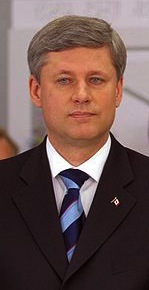First the big news! This just in! One of those darned activist judges has darned nearly legalized pot!
Holy cow, the government — whichever government! — has got only three months to fix this, or civilization as we know it is certain to end!
Really, I’m not just making this up to distract you from last night’s English-language federal leadership debate on the CBC, which was enough to make just about anyone wish they could get their hands on a little medical marijuana.
Certainly, Prime Minister Stephen Harper looked as though he could have used a little medicinal pick-me-up to soothe his nerves and keep his anger farther from the surface throughout the debate. Is it just me, or is it kind of weird the way he never showed his teeth?
The debate started pretty early — 5 p.m. out here in the solidly Conservative New West. So you have to wonder if the prime ministerial political advisers back there in Central Canada warned Harper that showing too big a grin to the people of Canada, especially with those colourless eyes that never smile, might scare the beejeepers out of the kiddies? (My goodness, Prime Minister, what big teeth you have!)
Well, never mind the teeth. Then there was the prime ministerial death gaze, which judging from the Twitter chatter, made a lot of Canadians pretty nervous, even without Canada’s leading market fundamentalist incisors on display. Apparently this was the result of advice from his handlers that he should look directly at his supporters out there in TV Land and not even acknowledge his challengers as anything but meaningless pipsqueaks.
Whatever the aim of this strategy, the result was that Harper looked to me like a very, very angry man — sort of like Basil Fawlty, only without the humour. He looked like someone who was seriously put out by having to explain his Shocking Doctrine neo-con bromides to anybody, let alone three people he just can’t stand, one of whom’s a liberal perfesser that he actually hates.
For their parts, Michael Ignatieff, Jack Layton and Gilles Duceppe reminded me of a trio high school drama teachers trying to show a class full of teenagers suffering from an overabundance of irony and hormones how to really put their hearts and souls into a theatrical role.
The question is, did the viewers care any more about the questions they were asking than a bunch of wound-up high schoolers would have? Notwithstanding the fact the contest was indecisive enough that any political spear-carrier can put any spin on the results they want, it’s hard to say and probably won’t be at all clear until election day.
Harper relied on the political version of boxing’s famous rope-a-dope defence, in which the fighter covers his head, leans on the ropes and waits for his opponent to tucker himself out pounding away at him until the tables can be profitably turned.
This works in the sweet science because there are usually only three fellows allowed in the ring, and one of them’s wearing a bow-tie and prohibited from throwing punches. But with four pugilists plus a referee, nobody got tired, and the thing just kind of ground along interminably for those of us devoted enough to the cause of one leader or another to resist the temptation to start surfing channels.
In Harper’s case, rope-a-dope meant not getting visibly mad and staying inside his tightly defined “message box” as Ignatieff of the Liberals, Layton of the NDP and Duceppe of the Bloc Quebecois took turns pointing out the obvious about his record.
And pretty clearly while Harper failed to inspire me — except with the creepiness of his watery smile, which never carried over to his eyes — neither did he make any major blunders. The conventional political-analyst interpretation of such an outcome is that that amounts to a victory for a politician who entered the election race ahead in the polls.
And maybe that’s so, though I can’t shake the feeling that with 850,000 or so Liberals out there (more than 4,000 of them right here in the Edmonton-St. Albert riding) who didn’t bother voting last time apparently because they couldn’t stand Stephane Dion, but who didn’t switch their votes to other parties either, that the whole thing may turn out to be more complicated than that.
Substantive issues? Don’t get me going about substantive issues? Substantive issues don’t matter to people who watch election campaign leadership debates.
They do it for the same reason folks pay to watch stock car racing and cage wrestling. They want to see cars smash up and blood on the mat.
In the absence of any spectacular crash-ups and verbal disasters, they’re looking for stray flashes of emotion or its opposite — like the PM’s gritted teeth, funeral parlour hair-do and glassy gaze, or Duceppe’s witty one-liners. (My favourite: “Mr. Harper says he’s tough on crime. He’s soft on crime in his office!“
You can count on one thing: ordinary voters will react to the debate instinctively, and will reach a different conclusion about who won and who lost than will pundits and professional spinners.
This post also appears on David Climenhaga’s blog, Alberta Diary.




